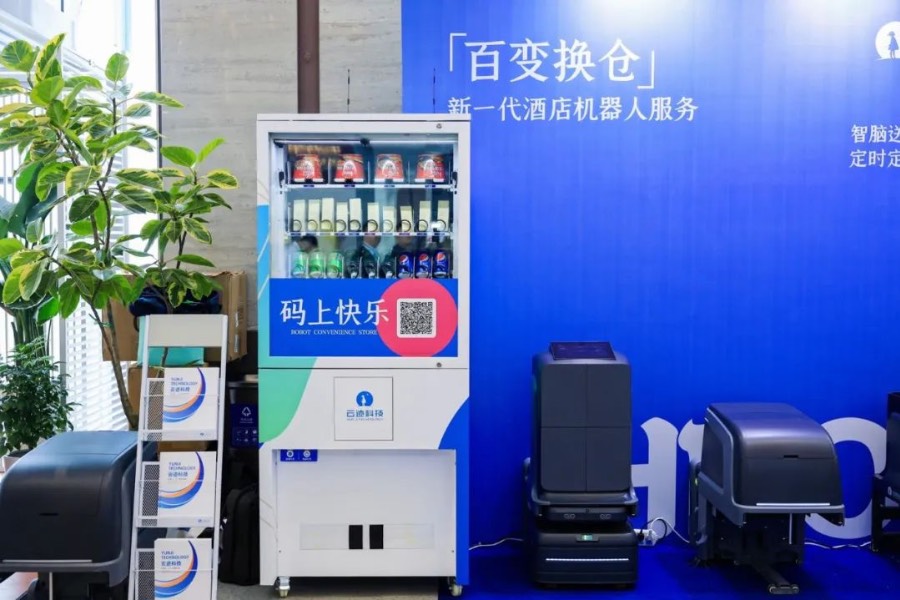
The surge in China’s hospitality sector digitization is driving demand for Yunji Technology’s robotic solutions.
Key Highlights:
- Yunji Technology has filed for a Hong Kong listing, with a reported revenue growth nearing 70% last year.
- The company, which specializes in hospitality robots, counts renowned investors like Alibaba and Tencent among its backers.
Robotic stocks are gaining momentum lately, buoyed partly by Nvidia’s CEO Jensen Huang’s optimistic remarks on the onset of a new robotic era at various events. This excitement is mirrored in tangible developments, notably Tesla’s planned humanoid robot launch.
The surge in enthusiasm for robotics has positively impacted companies like Dobot Corp. (2432.HK). Now, Beijing Yunji Technology Co. Ltd., focusing on hospitality robots, aims to leverage this trend through its filing for a Hong Kong stock exchange listing earlier this month.
Founded in 2014 by Hu Haijun, Hu Quan, and Wu Minghui, Yunji is among the more established players in the robotics field. Like many private firms in China, it retains a familial aspect, with Hu Haijun’s wife, Zhi Tao, serving as chairman. The company produces robots designed for various settings, including hotels, healthcare, factories, and communities, but primarily focuses on the hospitality sector.
The market for hospitality robotics in China is rapidly expanding, with revenue rising from 1.5 billion yuan ($207 million) in 2019 to 3 billion yuan in 2023, marking an annual growth rate of 18.7%, as per third-party data in its listing document. Advancements in AI are anticipated to enhance robotics functionality and scalability, potentially elevating the hospitality robotic market to 9.7 billion yuan by 2028.
Leading the Hospitality Robot Market
Yunji specializes in service-oriented robots that handle repetitive and labor-intensive tasks, with a focus on hospitality, accounting for 83% of its revenue. These robots perform various functions, including room service delivery and cleaning duties such as vacuuming and maintaining public spaces. Additionally, they assist with guest reception, provide navigation, and offer check-in and check-out services, improving the overall guest experience.
There is substantial potential for these robots within China’s bustling hospitality sector, which comprises hotel chains operating approximately 90,600 properties, totaling 16.5 million guest rooms as of the end of 2023. With the industry in a digital transformation phase aimed at enhancing guest experiences, improving efficiency, and cutting costs, over half of the hotels in China are planning to invest more in robotic technology. This positions Yunji favorably, as it holds 9% of the global hospitality robot market.
Strong Investor Support
Yunji’s promising outlook has attracted a diverse range of investors during its eight funding rounds. Notable backers include Alibaba, Tencent, PC manufacturer Lenovo, and travel giant Trip.com. Institutional investors such as Qiming Venture, Citic Securities, and China Everbright Group have also staked interests in the company.
Revenue for Yunji comes primarily from two channels. The larger segment, robots and functional kits, contributed 77.2% to last year’s revenue. AI-driven robotic services accounted for the remaining 22.8%. The company generates revenue through one-time product sales and recurring fees from leasing arrangements for its robots, while also offering AI-driven services for a fee.
In the past year, Yunji reported revenues of 245 million yuan, representing a remarkable 68.6% increase. The gross margin improved significantly, climbing 16.5 percentage points to 43.5%, resulting in a gross profit increase of 170% to 106 million yuan. However, substantial investment in research and development, sales, and marketing held back profitability, narrowing the net loss to 185 million yuan, down 30% year-on-year.
Expanding Beyond Hospitality
Yunji is exploring new opportunities beyond the hospitality sector by collaborating with food delivery and express delivery services. The company is focusing on integrating robotics into distribution systems, specifically targeting last-mile delivery to ease some logistical challenges faced by human couriers.
Reduction in production costs presents a potential opportunity for Yunji’s profitability turnaround. As local sourcing for robotic components increases and technology improves, the price of main control boards fell from 1,800-2,500 yuan in 2021 to 1,000-1,800 yuan last year. Similarly, electric motor prices dropped from 400-800 yuan to 250-500 yuan. The growth in economies of scale as Yunji expands its applications could lead to further gross margin improvements.
Seasonality also influences Yunji’s revenue. Currently heavily reliant on the hospitality sector, the company sees peaks during major tourism events like the National Day holiday in October and the Christmas and New Year’s period, resulting in higher second-half revenues.
Competition is intensifying as large players recognize the lucrative potential within the sector, particularly fueled by advancements in AI. Global tech giants, including Amazon (AMZN.US), Tesla (TSLA.US), and Nvidia (NVDA.US), are investing heavily in enhancing robotics, as well as South Korea’s Hyundai Motor, which acquired Boston Dynamics in 2020.
In the Hong Kong market, listed robotic companies showcase high price-to-sales ratios, with Ubtech Robotics (9880.HK) at 40 and Dobot at 87. If Yunji aims for a mid-range value of around 50 times, it could attract new investors, particularly due to its strong backing from notable investors.
© 2025 Benzinga.com. Benzinga does not provide investment advice. All rights reserved.









